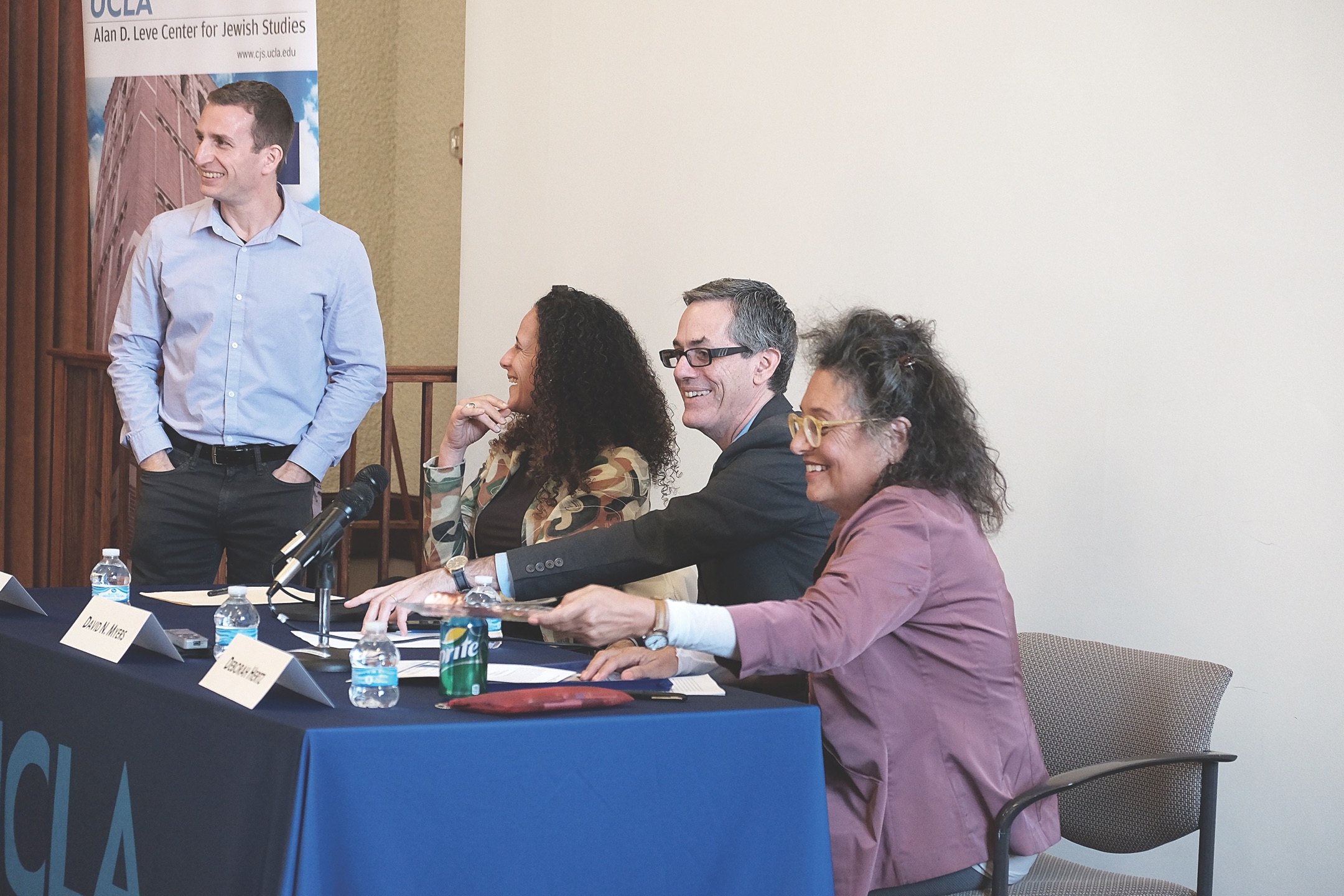 David N. Myers speaks during a book talk about his two latest works in Royce Hall at UCLA.
David N. Myers speaks during a book talk about his two latest works in Royce Hall at UCLA. Why in the world would anyone want to study Jewish history? This was the question addressed by David N. Myers at a Feb. 13 book talk in Royce Hall at UCLA, sponsored by the UCLA Alan D. Leve Center for Jewish Studies.
The event focused on Myers’ two recently published books. The first, “Jewish History: A Very Short Introduction,” offers a concise account of the entire course of Jewish history in 100 pages. The second, “The Stakes of History: On the Use and Abuse of Jewish History,” is an argument for the study of history, and especially Jewish history, as an anchor of memory and indispensable ingredient for informed civic engagement. The dialogue dealt with the intersecting themes of the two books, which together reveal the pleasures and payoff for studying Jewish history.
Myers is the incoming president and CEO of the Center for Jewish History in New York and also the Sady and Ludwig Kahn Professor of Jewish history at UCLA. His previous books include “Between Jew & Arab: The Lost Voice of Simon Rawidowicz” and “Resisting History: Historicism and Its Discontents in German-Jewish Thought.” Myers also is completing a book with Nomi Stolzenberg on the Satmar Chasidic community of Kiryas Yoel, N.Y.
Jewish history also can serve to disrupt historic narratives, achieve a measure of justice or retribution, provide empathy…
Myers’ two respondents at the event included Deborah Hertz, the Herman Wouk Chair in Modern Jewish Studies and a professor in the Department of History at UC San Diego; and Sarah Abrevaya Stein, professor of history and the Maurice Amado Chair in Sephardic Studies at UCLA. The program was moderated by Todd Presner, professor of Germanic languages, comparative literature and Jewish studies at UCLA, as well as the Sady and Ludwig Kahn Director of the UCLA Center for Jewish Studies.
“Studying Jewish history is ceaselessly fascinating,” began Myers, who was inspired 32 years ago by his great teacher and mentor, Yosef Hayim Yerushalmi, author of the book “Zakhor: Jewish History and Jewish Memory.” In fact, Myers’ book “Jewish History: A Very Short Introduction” is an homage to Yerushalmi, who inspired in Myers a love and passion for Jewish history, enabling Myers for the first time to view it as “polychromatic rather than black and white.”

Myers’ objective in the book was to answer the questions of how and why the Jews managed to survive. He came up with two explanations: anti-Semitism on one hand and assimilation on the other. The hatred of anti-Semitism tended to confirm the identity of Jewish separateness. Over and over again, assimilation flexed the cultural muscle of Judaism.
Beyond its value as a mere accumulation of facts, Jewish history further serves as a witness to events and movements. While history serving life is not unique to Jews, Myers finds Jewish history to be a meaningful guide to life, providing enjoyment, edification, and a predictive capacity by observing patterns from the past that shape blueprints for the future.
Jewish history, as Myers stated, also can serve to disrupt historic narratives, achieve a measure of justice or retribution, provide empathy, and recover lost voices that have been extinguished. “It is an essential repository of discarded ideas which may offer us new ways out of our current quagmires. To me, then, it is a moral imperative to study the past, not just a professional obligation.”
Myers concluded his presentation with a look at history’s future. “History is going to be compelled to adopt new modes of communication in order to be heard — op-ed writing, podcasts, short-form journalism, etc.” He also offered that, “Culture is the lifeblood of Jewish history.” And in terms of the responsibility of the historian: “I’m a historian who believes I have a moral obligation to act and write based on my historical creed.”
The event’s sponsor, the UCLA Alan D. Leve Center for Jewish Studies, is dedicated to advancing scholarship in all areas of Jewish culture and history, educating the next generation about the role of Judaism in world civilization, and serving as an exceptional public resource for Jewish life and learning.
Mark Miller is a humorist and journalist who has performed stand-up comedy on TV and written for a number of sitcoms.






















 More news and opinions than at a Shabbat dinner, right in your inbox.
More news and opinions than at a Shabbat dinner, right in your inbox.